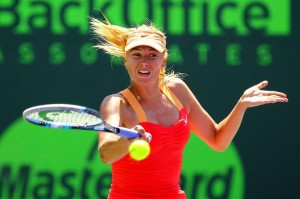By Thomas Swick
It’s getting quieter here, and not just because Victoria Azarenka is gone. There was no cluster of cars at the Rickenbacker tollbooth this morning; no great multitude waiting impatiently to cross Crandon Boulevard into the tennis center.
Near noon, the desks in the media center were still mostly empty. My neighbor from The Asahi Shimbun left town after the loss of Kei Nishikori.
The day’s schedule, once so crowded with names you could barely read some of them, now has almost as much white space as print. Some wag has placed a battered old tennis ball in the top cup at the water cooler. It sits there like a symbol (rebuke?) of all the balls we’ve watched over the last nine days.

Fans who arrived early for the Caroline Wozniacki-Maria Sharapova match (probably not Miamians) got a taste of the low-key atmosphere when they walked in the stadium and saw Mardy Fish casually serving aces to a hitting partner. He whacked the last ball high into the stands and then walked toward the tunnel unimpeded. Not a single kid was there to bother him for an autograph.
The match began a little after 1, and Sharapova started and – more important – finished strong, hitting more than five times as many winners as her opponent. Still upset with a call on Sharapova’s ultimately winning serve, Wozniacki shook the victor’s hand but not the chair umpire’s. In her press conference she looked so forbidding – her expression conveying a kind of fuming grief – that a number of reporters (like me) didn’t dare venture a question. The ones she did get, she answered briefly, in an accent that at times sounded vaguely Irish.
Fish came out next, with Argentina’s Juan Monaco. It must feel strange to play a couple hours’ drive from your old home and hear louder support for your opponent who hails from a country that’s thousands of miles away. So strange, perhaps, that it affects your play, as Fish fell easily in straight sets. Kids now stood outside the tunnel with oversized balls but Fish – like every other loser I’ve seen – refused to acknowledge their existence.
There have been a lot of strange things happening here. Roddick beating Federer. The last Argentinian standing being not Del Potro but Monaco. (Think of all the people who bought tickets for the semis imagining they’d see Federer, a few of them, at least, now asking themselves, ‘Who the hell is Monaco?’) The seemingly invincible Azarenka silenced by Bartoli.
I needed some air to clear my head, so I took my daily stroll through the grounds. A young Mexican woman, who’d come with her father, complained about the Argentinian fans, saying she told a group of them, “It’s not a soccer match.”
On Court 3 I found two ball boys and one ball girl playing with a ball. (Nothing odd about that.) On hearing I was a writer, they asked if I’d ever written about the ball kids. I told them I had, yesterday. Then I asked them which players treated them the nicest.
“Ivanovic,” the girl said. “She’s really nice.”
“Djokovic,” the taller of the boys said. “All the Serbians are nice.”
I said I’d heard the French can be difficult. They all nodded their heads, adding that Monfils and Tsonga were exceptions. The tall one said that they’re given a talk before they work a match with Llodra.
“Nadal is nice,” the other ball boy said. “He always says, ‘Gracias.’”
I asked about Federer, but none had had the pleasure. “I’ve done Nadal matches seven times,” the girl said. (This was not their first year; they were veteran ball kids.) “I would trade seven Nadal matches for one Federer match.”
Back in the stadium, I watched Djokovic fail to serve out the match against Ferrer. But, bringing things back to normal, he cruised through the tiebreak. Before stepping into the tunnel, the vanquished Spaniard stopped and signed autographs.
In the last match, Marion Bartoli and Agnieszka Radwanska rallied strongly in the first set until Bartoli went off with a trainer. She reappeared with her left thigh wrapped. Limping noticeably, she lost the set. It looked as if that would be all. But after struggling to get her serve in, she started rallying as before. At 4-2, Radwanska’s turn to serve, the lights went out and the stadium was plunged in darkness.
Immediately the back-up lights came on, and the booths and exits and scoreboards all emitted an eerie glow. But the court remained in darkness. The players retreated to the locker. Twenty minutes later, when the lights returned, many of the fans had left, and those who’d stayed moved down to the front rows. It was like a night match at the U.S. Open, though without the drama. Radwanska won the next two games and the two women, in full light, exchanged kisses at the net.
